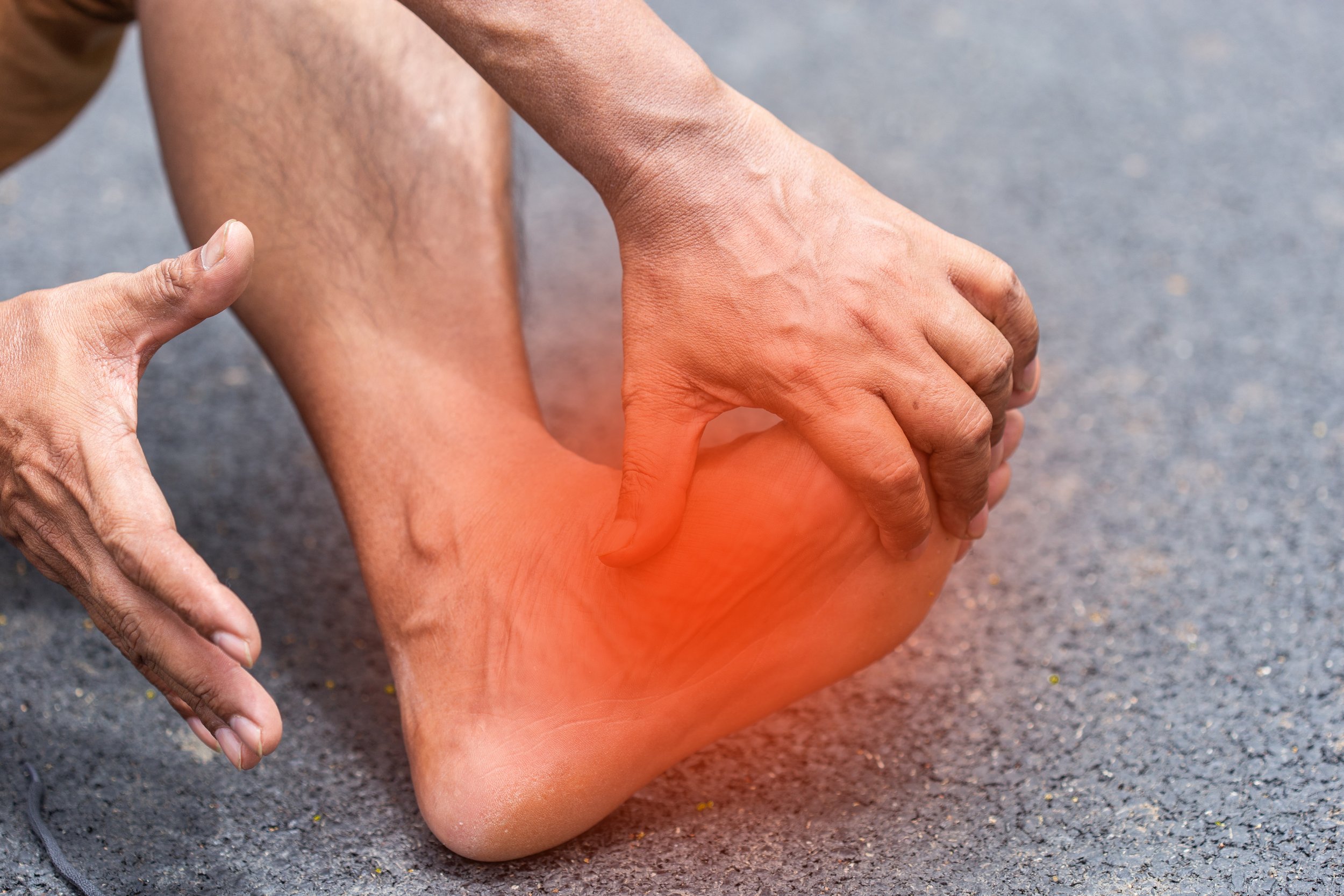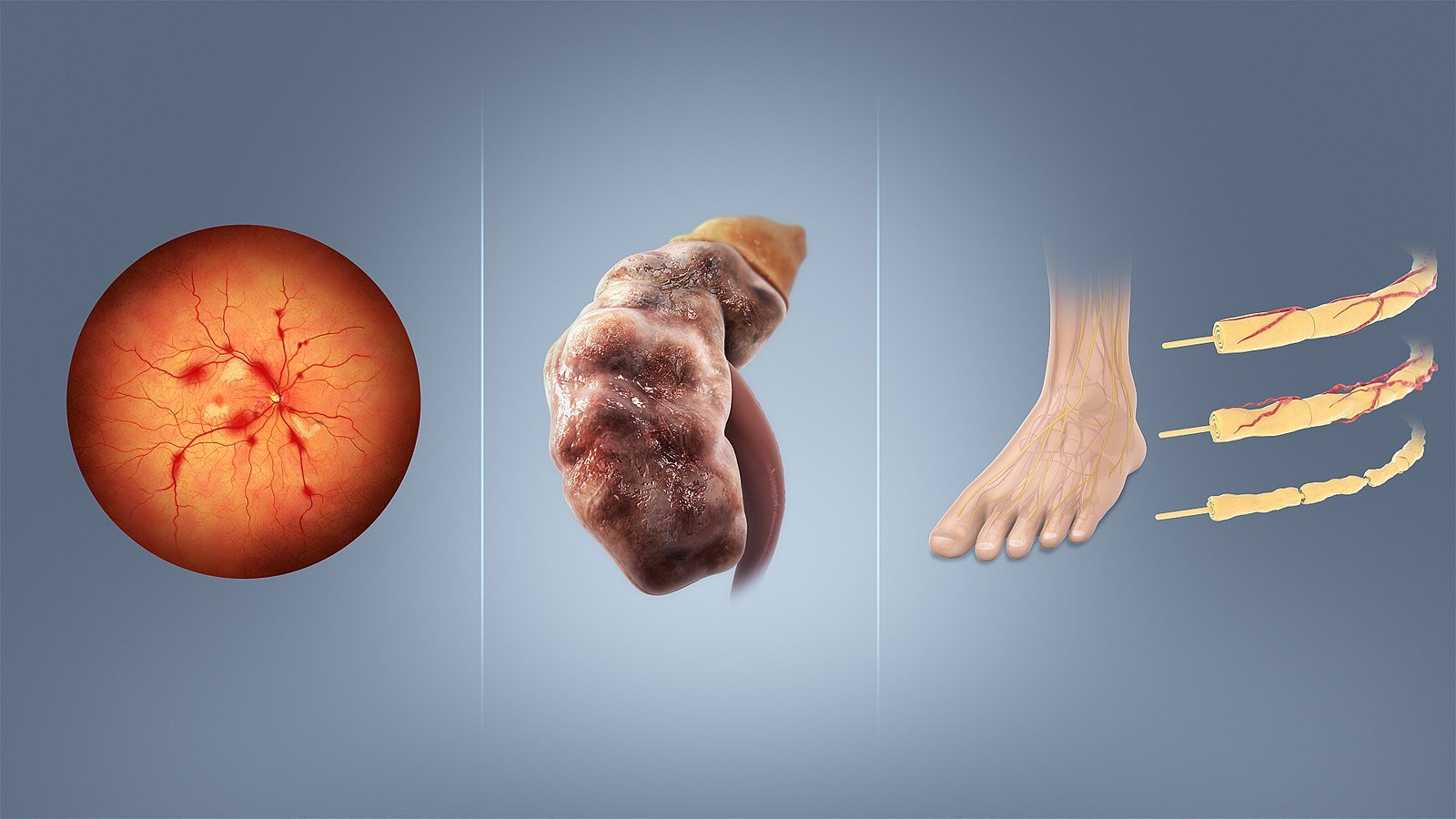
Neuropathy
Find natural and effective relief from neuropathy with homeopathy and integrative medicine.
Neuropathy & Natural Treatment
Are you living with neuropathy and feeling tired of chronic pain? Have you tried countless prescription medications and treatments without finding lasting relief? It's time to try something different.
Here at Nielsen Clinic, holistic treatment is provided for chronic pain using homeopathic medicine and nutraceuticals. A personalized approach is always used, ensuring the best treatment plan is created for your specific needs and goals.
Homeopathic medicine is a natural, gentle and effective form of healthcare that has been used for centuries to treat a wide range of health conditions. It works by stimulating the body's own healing mechanisms, targeting the root cause of your pain rather than just masking the symptoms with temporary relief.
Nutraceuticals are natural, plant-based supplements that provide essential nutrients and support the body's natural healing processes. They can be an excellent complement to homeopathic treatment and can help to reduce inflammation, improve circulation and promote overall health and wellness.
Don't let chronic pain control your life any longer. Contact us today to learn more about how our holistic approach to healthcare can help you find relief and get back to living your best life.
Homeopathy & Nutraceutical (supplements) for Neuropathy
Neuropathy is a medical condition that occurs when there is damage to the nerves that carry messages between the brain and the rest of the body. This can lead to a wide range of symptoms including pain, numbness, tingling and muscle weakness.
Some people suffering from neuropathy struggle with their balance and coordination, while others may endure pain and discomfort. In extreme cases, muscle weakness brought on by neuropathy can make it difficult to walk and grasp objects.
This condition can be caused by a variety of factors including diabetes, alcohol abuse, certain medications and autoimmune conditions.
Integrated medicine approaches healthcare holistically, focusing on the individual rather than just one symptom or illness. This means that in the case of neuropathy, any underlying causes or supporting factors (in addition to the nerve injury itself) would be taken into account.
The goal of integrative medicine is to address the root cause of a health condition, rather than just treating the symptoms. This can help to not only alleviate symptoms in the short term, but also to prevent the condition from worsening over time.
Treatment for neuropathy may involve a combination of lifestyle changes, homeopathic medicines and nutraceuticals.
What is neuropathy?

What causes neuropathy?
Damage to the nerves that transmit signals from the brain to the body's other organs results in neuropathy, a medical ailment. Numerous symptoms, such as discomfort, numbness, tingling, and muscle weakness, may result from this.
The particular underlying cause of neuropathy might change from person to person and has a wide range of potential causes. The following are some typical neuropathy causes:
Diabetes: Over time, high blood sugar levels can harm nerves, resulting in neuropathy. High blood sugar levels in diabetics can lead to inflammation and damage to the blood vessels that provide nutrition and oxygen to the neurons. Neuropathy and nerve damage may result from this.
Chronic alcohol usage can cause neuropathy and damage to the nerves. Alcohol can prevent the body from absorbing critical vitamins and minerals including thiamine (vitamin B1), which is crucial for healthy nerves. Additionally, alcohol can harm nerve cells directly, which might result in neuropathy.
Nutritional deficiencies: Nerve injury and neuropathy can result from a lack of certain vitamins and minerals, including vitamin B1, B6, and B12. A lack of these vitamins and minerals can cause neuropathy and nerve damage, which are both detrimental to the health of the nervous system.
A disturbance in the nerves' regular function is a common cause of neuropathy. Numerous things, such as inflammation, nerve injury, and a deficiency in vital nutrients, could be the cause of this.
Others may struggle with their balance and coordination while others may endure pain and discomfort. Muscle weakness brought on by neuropathy can, in extreme situations, make it difficult to walk and grasp objects.
Inflammation
Inflammation can occur in the body as a result of an underlying condition such as diabetes or an autoimmune disorder. When the nerves are subjected to chronic inflammation, it can lead to damage and dysfunction. This can cause a range of symptoms including pain, numbness, tingling and muscle weakness.
Nerve Damage
Nerve damage (or neuropathy) can occur as a result of a variety of factors including physical injury, infection and exposure to toxins. When the nerves are damaged, it can interfere with their ability to transmit messages between the brain and the rest of the body. This can lead to a range of symptoms including pain, numbness, tingling and muscle weakness.
Nutrition
A lack of certain vitamins and minerals such as vitamin B1, B6, and B12 can lead to nerve damage and neuropathy, as these are important for the proper functioning of the nerves.
Diabetic Neuropathy
Diabetic neuropathy can develop in people with diabetes as a result of persistently high blood sugar levels. It’s a typical diabetic consequence and can cause a variety of symptoms such as pain, numbness, tingling and muscular weakness.
Diabetic neuropathy is caused by a number of processes. Blood arteries that provide oxygen and nutrients to the neurons might become inflamed and damaged as a result of high blood sugar levels, potentially resulting in nerve dysfunction and injury.
Additionally, high blood sugar levels might impair the body's capacity to use and store several minerals including potassium, which is crucial for the health of the nervous system.
People with both type 1 and type 2 diabetes run the risk of developing diabetic neuropathy if their blood sugar levels are not properly managed. Additionally, old age, smoking and high blood pressure can make someone more likely to develop diabetic neuropathy.
The purpose of holistic treatment is to reduce symptoms and stop the illness from getting worse over time. Treating diabetic neuropathy often involves a mix of medicine, food and exercise to control blood sugar levels. Other therapies include acupuncture, massage and medications to manage pain and other symptoms.
Natural Treatment Options for Neuropathy A Modern Holistic Approach Using Homeopathy & Nutraceuticals
There are 3 steps we take to help support you with warts:
Step 1 - Assess lifestyle, emotional & physical
Taking your lifestyle and stress into account is important for neuropathy because they can both have a significant impact on the severity and management of your condition:
Lifestyle Factors: Diet, exercise and smoking can all affect your neuropathy. For example, a poor diet low in essential nutrients may contribute to the development of neuropathy, while regular physical activity can help to improve symptoms. Smoking can worsen neuropathy by reducing blood flow to the nerves.
Stress: Chronic stress can contribute to the development of neuropathy or make your existing symptoms worse. It can also make it more difficult for you to manage your condition effectively.
By taking these factors into account, steps can be taken to manage your condition more effectively.
Step 2 - Address Clinical Symptoms
Treating the clinical symptoms of your neuropathy with holistic medicine can be more effective and have longer-lasting effects.
Targeting the underlying cause of your neuropathy is one of the main benefits of using an integrative medicine treatment plan. By addressing the underlying source (such as a compromised immune system or exposure to certain toxins) can create better and longer-lasting results for you.
Another benefit of treating your clinical symptoms with integrative medicine is the customized treatment plan. This is particularly advantageous for conditions like neuropathy because it can be influenced by a number of variables including underlying medical issues, lifestyle factors and heredity. A personalized treatment plan can help in choosing the best therapies to fit your particular needs and circumstances.
Homeopathic remedies and dietary supplements may promote neuropathy healing and improve your overall quality of life.
At Nielsen Clinic, my treatment approach is all about understanding your specific health concerns. I can design a customized treatment plan to help you with your neuropathy.
This personalized approach is based on over 17 years of clinical experience and published medical research. I have treated many people suffering with neuropathy and helped them achieve their health goals over the years.
Homeopathic medicine and nutraceuticals can address the root cause of your neuropathy, rather than just target the symptoms.
Step 3 - Improve Healing Response
Homeopathic medications and nutraceuticals can improve outcomes for your neuropathy by supporting your body's natural healing processes. Instead of only treating your symptoms, these complementary therapies aim to activate your body's own healing abilities.
Homeopathic treatments may be able to lower inflammation, encourage tissue repair and enhance circulation - all of which are crucial for the healing of neuropathy. The body's natural healing processes and treatment outcomes may be supported by nutraceuticals, such as certain vitamins and minerals.
Homeopathic remedies and nutraceuticals may also be able to assist in reducing your symptoms including pain, numbness and tingling. This can result in quicker healing and a better overall outcome for you.
As an added bonus, homeopathic medicines and nutraceuticals are typically well-tolerated and have few negative side effects. They are a safe and practical choice if you are looking for a natural and integrative approach to help with your neuropathy.
Book an appointment.
Are you ready to reclaim your health? It all begins with taking the first step of filling out the form to request an appointment!
It’s important to me to provide guidance and support through a science-based, holistic and integrative approach using homeopathic medicine and nutraceuticals. I will help you identify the root causes of your health issues and develop a plan to address them.
While monitoring your progress and adjust your treatment plan as needed to ensure you achieve your health goals. I will provide information along the way to help you make informed decisions about your own care, while offering support and encouragement to help you stay on track with your health goals.
To your success,
Dr. Vijay Nielsen, DMS HD RAHom-A
Homeopathic Doctor | Registered Homeopath – Calgary, Alberta Canada Integrative Medicine
Sources
Areti, A., Yerra, V. G., Naidu, V., & Kumar, A. (2014). Oxidative stress and nerve damage: role in chemotherapy induced peripheral neuropathy. Redox Biology, 2, 289–295. https://doi.org/10.1016/j.redox.2014.01.006
Dejgaard, A. (1998). Pathophysiology and treatment of diabetic neuropathy. Diabetic Medicine: A Journal of the British Diabetic Association, 15(2), 97–112. https://doi.org/10.1002/(SICI)1096-9136(199802)15:2<97::AID-DIA523>3.0.CO;2-5
Galeotti, N. (2017). Hypericum perforatum (St John’s wort) beyond depression: A therapeutic perspective for pain conditions. Journal of Ethnopharmacology, 200, 136–146. https://doi.org/10.1016/j.jep.2017.02.016
Haak, E., Usadel, K. H., Kusterer, K., Amini, P., Frommeyer, R., Tritschler, H. J., & Haak, T. (2000). Effects of alpha-lipoic acid on microcirculation in patients with peripheral diabetic neuropathy. Experimental and Clinical Endocrinology & Diabetes, 108(3), 168–174. https://doi.org/10.1055/s-2000-7739
Han, T., Bai, J., Liu, W., & Hu, Y. (2012). A systematic review and meta-analysis of α-lipoic acid in the treatment of diabetic peripheral neuropathy. European Journal of Endocrinology, 167(4), 465–471. https://doi.org/10.1530/EJE-12-0555
Heidari, N., Sajedi, F., Mohammadi, Y., Mirjalili, M., & Mehrpooya, M. (2019). Ameliorative effects of N-acetylcysteine as adjunct therapy on symptoms of painful diabetic neuropathy. Journal of Pain Research, 12, 3147–3159. https://doi.org/10.2147/JPR.S228255
Kale, M. B., Bajaj, K., Umare, M., Wankhede, N. L., Taksande, B. G., Umekar, M. J., & Upaganlawar, A. (2022). Exercise and nutraceuticals: Eminent approach for diabetic neuropathy. Current Molecular Pharmacology, 15(1), 108–128. https://doi.org/10.2174/1874467214666210629123010
Kishore, L., & Singh, R. (2017). Effects of different homeopathic potencies of Cephalendra indica in treatment of neuropathic pain in streptozotocin induced diabetes. Bulletin of Faculty of Pharmacy Cairo University, 55(2), 273–280. https://doi.org/10.1016/j.bfopcu.2017.06.002
Mishra, G., Singh, P., Molla, M., Shumet Yimer, Y., Ewunetie, A., Yimer Tadesse, T., Mengie Ayele, T., & Kefale, B. (2022). Nutraceuticals: A source of benefaction for neuropathic pain and fibromyalgia. Journal of Functional Foods, 97(105260), 105260. https://doi.org/10.1016/j.jff.2022.105260
Mostacci, B., Liguori, R., & Cicero, A. F. (2018). Nutraceutical approach to peripheral neuropathies: Evidence from clinical trials. Current Drug Metabolism, 19(5), 460–468. https://doi.org/10.2174/1389200218666171031145419
Naik, A. K., Tandan, S. K., Dudhgaonkar, S. P., Jadhav, S. H., Kataria, M., Prakash, V. R., & Kumar, D. (2006). Role of oxidative stress in pathophysiology of peripheral neuropathy and modulation by N-acetyl-L-cysteine in rats. European Journal of Pain (London, England), 10(7), 573–579. https://doi.org/10.1016/j.ejpain.2005.08.006
Pasero, C. (2004). Pathophysiology of neuropathic pain. Pain Management Nursing: Official Journal of the American Society of Pain Management Nurses, 5(4 Suppl 1), 3–8. https://doi.org/10.1016/j.pmn.2004.10.002
Pomposelli, R., Piasere, V., Andreoni, C., Costini, G., Tonini, E., Spalluzzi, A., Rossi, D., Quarenghi, C., Zanolin, M. E., & Bellavite, P. (2009). Observational study of homeopathic and conventional therapies in patients with diabetic polyneuropathy. Homeopathy: The Journal of the Faculty of Homeopathy, 98(1), 17–25. https://doi.org/10.1016/j.homp.2008.11.006
Schloss, J. M., Colosimo, M., Airey, C., Masci, P. P., Linnane, A. W., & Vitetta, L. (2013). Nutraceuticals and chemotherapy induced peripheral neuropathy (CIPN): a systematic review. Clinical Nutrition (Edinburgh, Scotland), 32(6), 888–893. https://doi.org/10.1016/j.clnu.2013.04.007
Starobova, H., & Vetter, I. (2017). Pathophysiology of chemotherapy-induced peripheral neuropathy. Frontiers in Molecular Neuroscience, 10, 174. https://doi.org/10.3389/fnmol.2017.00174
Tavakoli, M., Mojaddidi, M., Fadavi, H., & Malik, R. A. (2008). Pathophysiology and treatment of painful diabetic neuropathy. Current Pain and Headache Reports, 12(3), 192–197. https://doi.org/10.1007/s11916-008-0034-1
Vallianou, N., Evangelopoulos, A., & Koutalas, P. (2009). Alpha-lipoic Acid and diabetic neuropathy. The Review of Diabetic Studies: RDS, 6(4), 230–236. https://doi.org/10.1900/RDS.2009.6.230


